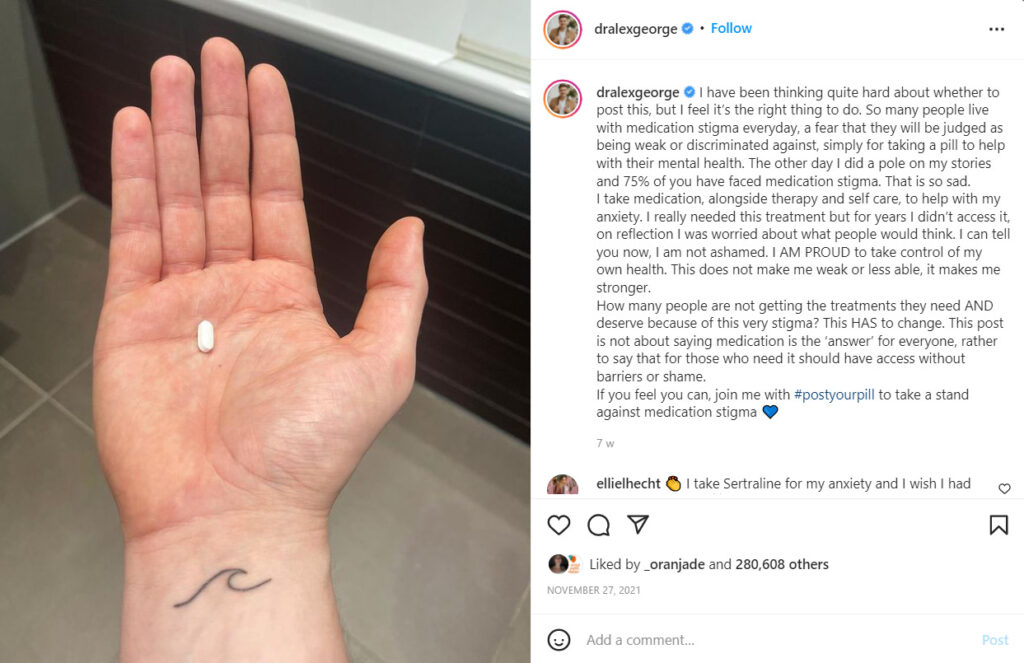
One in eight adults in England receive mental health treatment, with 10.4% of these adults receiving medication as either sole or part of their treatment. (McManus S et al., 2014)
Despite this, there is still stigma attached to the use of mental health medications. However, the good news is, there are numerous campaigns and resources that have been created to dispel the negative connotations and myths that surround the subject.
A recent example of a campaign aimed at breaking down the stigma surrounding medication and mental health is the #PostYourPill campaign. At the end of 2021, Dr Alex George, UK Youth Mental Health Ambassador, shared a post on his social media, revealing that he takes medication for anxiety. He encouraged others to share their mental health medications with the hashtag #PostYourPill.
The campaign was well received and hundreds of thousands of people shared their stories and experiences with mental health medications via the hashtag.
The post discussed the stigma faced by others. Dr Alex George wrote: “…So many people live with medication stigma every day, a fear that they will be judged as being weak or discriminated against, simply for taking a pill to help with their mental health.”
He went on to say: “How many people are not getting the treatments they need AND deserve because of this very stigma? This HAS to change. This post is not about saying medication is the ‘answer’ for everyone, rather to say that those who need it should have access without barriers or shame…”

This is a great example of the positive effect social media can have on mental health, as it is commonly perceived to negatively impact us. Read more about the impact of social media on mental health.
Dr Alex highlighted the prevalence of medication stigma in his post, and this has been widely evidenced in research literature.
A cross-sectional study by Keziban Salaheddin and Barbara Mason (2016) aimed to identify the barriers that young adults in the UK face when seeking help for mental health diagnoses, and the results highlighted that individuals perception of possible stigma was one of the most common barriers to accessing treatment.
Participants in the study were young adults in the UK aged 18-25, who filled out an anonymous online questionnaire.
The questionnaire included a list of 12 barriers in the form of a “stigma scale”. Among the stigma related barriers from the list, feeling embarrassed or ashamed (81.4%), concern that seeking help may affect job applications (77.4%) and “concern that I may be seen as weak” (75.1%) were the top three barriers identified as reasons for not seeking help.
In addition, 75.9% of participants reported concerns about available treatments (for example mental health medication side effects). Over 65% of participants also reported concern about what family, friends and colleagues may think.
The questionnaire also included an open-ended question for participants who reported not seeking help, which allowed participants to list their own reason(s) for this. Stigmatising beliefs, both public and self, regarding mental health stood out as a prominent theme. Some participants reported that they felt asking for help was weak or pathetic, while other concerns included worrying about what family, friends, colleagues, professionals, or new relationships would think.
These findings strongly demonstrate that stigma is still a very valid reason that people avoid seeking help for mental health diagnoses.
However, due to the demographics of the population sample, these results cannot be generalised to the wider population as they may not be entirely representative.
We must continue to work towards destigmatising mental health medications, to ensure that stigma is never the reason someone does not seek help when they need it. We take medications for our physical health, and mental health is no different.
Although it can sometimes be difficult and challenging, talking openly about mental health and mental health medications is the best way of breaking down the stigma. Campaigns such as #PostYourPill are a great way of doing this, as more and more people share their stories and experiences, it becomes normalised rather than stigmatised.
Speak to your GP if you have any questions or concerns about medication.
Remember to reach out if you are struggling and talk to family and friends. If you would prefer to chat with someone anonymously, you can call Samaritans on 116 123, or email: jo@samaritans.org for a reply within 24 hours.
If you don’t want to speak to someone on the phone, you can contact the free confidential text service, SHOUT, by texting 85258 (Text YM if you’re under 19). SHOUT is available 24/7.
McManus S, Bebbington P, Jenkins R, Brugha T. (eds.) (2016) Mental health and wellbeing in England: Adult Psychiatric Morbidity Survey 2014. Leeds: NHS Digital.
Keziban Salaheddin, Barbara Mason (2016), Identifying barriers to mental health help-seeking among young adults in the UK: a cross-sectional survey.
This article from Patient.info (a comprehensive directory of evidence based clinical information) looks at some of the common myths that contribute to the stigma of mental health medications.
This comprehensive article looks at the different types of stigma.
Mind has some information on how to deal with stigma.
Photo by Towfiqu barbhuiya on Unsplash.